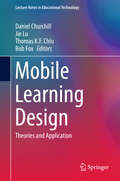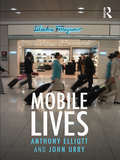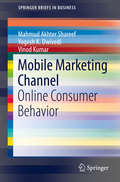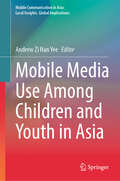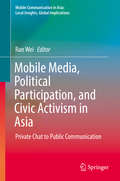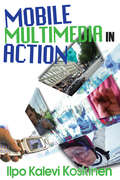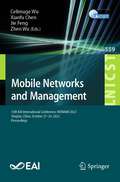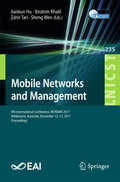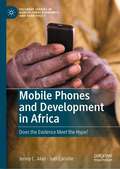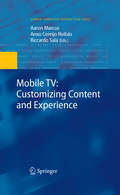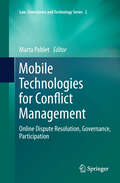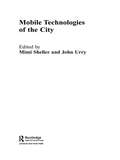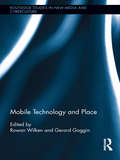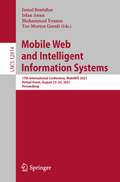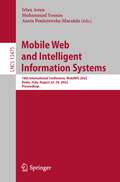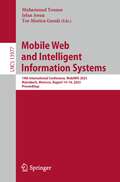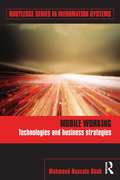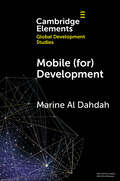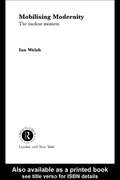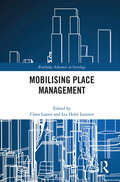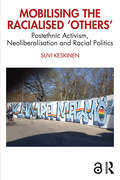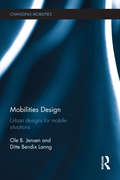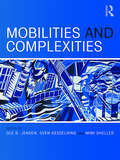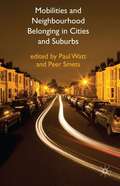- Table View
- List View
Mobile Learning Design
by Bob Fox Daniel Churchill Jie Lu Thomas K.F. ChiuThis book focuses on mobile learning design from both theoretical and practical perspectives. It introduces and discusses how mobile learning can be effectively integrated into curricula, highlighting the design of four key components of learning-centric pedagogy: Resource, Activity, Support and Evaluation in the context of mobile learning. It also investigates the learning theories underpinning mobile learning design, and includes case studies in different contexts. It provides practical insights that allow teachers to change and transform teaching practices using mobile technology. Anyone involved in mobile-technology enhanced learning and teaching will find this book both informative and useful.
Mobile Lives (International Library of Sociology)
by John Urry Anthony ElliottHow should we understand the personal and social impacts of complex mobility systems? Can lifestyles based around intensive travel, transport and tourism be maintained in the 21st century? What possibility post-carbon lifestyles? In this provocative study of "life on the move", Anthony Elliott and John Urry explore how complex mobility systems are transforming everyday, ordinary lives. The authors develop their arguments through an analysis of various sectors of mobile lives: networks, new digital technologies, consumerism, the lifestyles of ‘globals’, and intimate relationships at-a-distance. Elliott and Urry introduce a range of new concepts – miniaturized mobilities, affect storage, network capital, meetingness, neighbourhood lives, portable personhood, ambient place, globals – to capture the specific ways in which mobility systems intersect with mobile lives. This book represents a novel approach in "post-carbon" social theory. It will be essential reading for advanced undergraduate students, postgraduates and teachers in sociology, social theory, politics, geography, international relations, cultural studies, and economics and business studies.
Mobile Marketing Channel
by Yogesh K. Dwivedi Mahmud Akhter Shareef Vinod KumarThis book attempts to address, explore, and conceptualize the epistemological paradigms of SMS as an alternative marketing channel or in combination with other existing traditional channels. It promotes a multichannel strategy in the light of synthesized marketing distribution, consumer behavior, and information and communication technology (ICT)-related behavioral theory to develop, establish, and launch a guiding theory and practice for this emerging area. Usage of mobile phones and hand-held wireless devices is growing and diffusing so quickly that 21st century marketing managers find a great potential for this wireless channel to be the most effective media for maintaining a consumer relationship that provides the highest quality service. The emergence of SMS-based direct marketing as a distinct channel or embedded with other channels is characterized by several issues, challenges, barriers, and limitations. This book examines and postulates the following interrelated issues related to wireless marketing (particularly the SMS-based marketing channel): (i) Consumer behavior for mobile phone SMS - perception, exposure, and attention; (ii) Consumer attitudes toward SMS-based marketing channels; (iii) The scope of SMS to meet consumer service output demands from an online channel; (iv) Consumer selection criteria for mobile phone SMS channel structure; (v) Mobile channel structure as an efficient and effective consumer interaction mode; and (vi) Consumer multichannel behavior. It is important to use the SMS-based mobile channel as a radical tool of interactive marketing and seamless service marketing, as there is the opportunity to maximize, u ntil now, unutilized benefits of this efficient and popular direct marketing channel.
Mobile Media Use Among Children and Youth in Asia (Mobile Communication in Asia: Local Insights, Global Implications)
by Andrew Zi Han YeeThis book examines mobile media use among children and youths within an Asian context. By studying the impact of mobile media on children and youth in Asia, it focuses on the explosive growth of mobile media among young people and seeks to understand the potential consequences of mobile media use on society, relationships, and what it means to be a young person. With this, it provides a richly contextualized Asian voice to research on mobile media and young people, enriching the global conversation surrounding an increasingly central aspect of youths’ everyday lives. Research on mobile media and its impact on children and youths in Asia is not thoroughly represented, despite the proliferation of smartphone and tablet use in the region. This volume fills this gap by canvassing contemporary research on mobile media, children, and youth in Asia through the perspectives of emerging scholars in the region and beyond. It promotes an understanding of the motivations and patterns of use by children and youth in the region, examines contemporary research on the antecedents and consequences of mobile media use on society, relationships, and the individual, and provides a critique of mobile media use among children and youth. The volume also provides a culturally sensitive examination of mobile media use among children and youth, describing and analyzing policies enacted to manage young people’s smartphone use. It acknowledges Asia as a large and diverse region with differing linguistic, cultural, and sociopolitical traditions and contexts, and so the work does, as far as possible, look to ensure geographic and cultural diversity by prioritizing works from countries that are typically underrepresented. It is a relevant text to graduates and researchers in communication and media studies, social and developmental psychology, human development studies, science and technology, information systems, and design science.
Mobile Media, Political Participation, and Civic Activism in Asia
by Ran WeiThis book explores how personalized content and the inherent networked nature of the mobile media could and do lead to positive externalities in social progress in Asian societies. Empirical studies that examine uses of the mobile phone and apps (voice mailing, SMS, mobile social media, mobile Weibo, mobile WeChat, etc. ) are featured as a response to calls for theorization of the mobile media's efficacy as a tool for citizen engagement and participation in civic and political affairs, especially in the search for collective solutions to widespread social problems of food safety, pollution, government corruption, and public health risks. Considering the vast cultural diversity of Asian societies that are shaped by different levels of political, social, economic, and religious development, the book offers nuanced studies that provide in-depth analysis of the mobile media and political communication in a variety of communities of leading Asian countries. From the country-specific studies, broad themes and enduring concepts emerge.
Mobile Methods
by Monika BüscherIn the twenty-first century, more than ever, everything and everybody seems to be on the move. Global flows of people, goods, food, money, information, services and media images are forming an intensely mobile background to everyday life. Social scientists, too, are on the move, seeking new analytical purchase on these important aspects of the social world by trying to move with, and to be moved by, the fleeting, distributed, multiple, non-causal, sensory, emotional and kinaesthetic. Mobile Methods addresses the challenges and opportunities of researching mobile phenomena. Drawing on extensive interdisciplinary discussion, the book brings together a collection of cutting-edge methodological innovations and original research reports to examine some important implications of the mobilities turn for the processes of ‘research’, and the realm of the empirical. Through analysis that addresses questions such as ‘how are social relationships and social institutions made in and through mobility?’, and ‘how do people experience mobility in twenty-first century world cities?', the authors mobilize sociological analysis, bringing new insights and opening up new opportunities for engagement with contemporary challenges. This book is a key text for undergraduate and postgraduate students of disciplines including Human Geography, Social Policy, Sociology and Research Methods.
Mobile Multimedia in Action
by Ilpo Koskinen"Mobile Multimedia in Action" displays a revealing picture of how people communicate using camera phones and other mobile multimedia devices. With such devices spreading faster than practically any other new technology, questions about how these devices are being used (and abused) to capture and distribute embarrassing or raunchy images and content, and what should be done about it, are surfacing. This volume presents the first detailed study of the use of these devices. Using a variant of social science research known as ethnomethodology, Koskinen explores the kinds of images people take with camera phones and how they use sound to enhance these images. The book asks two main questions. First, what kinds of methods of expression, such as visuals or sound, do people use when they design multimedia messages? Second, how do people interact with and respond to each other through mobile multimedia devices? Koskinen has a broader objective centering on the impact of these devices on human relationships and society at large. He asks, What do people do with these devices? Is mobile telephony moving toward a more practical direction, or will it simply become a visual chatty channel fit for gossip but not for real news or other practical purposes? What kind of social activities and organizations does it best serve - peer-to-peer networks or institutional ones? Koskinen examines these questions from three unique perspectives: the design elements of mobile multimedia, which considers methods of expression people use in designing multimedia messages; mobile multimedia as interaction, which looks into how people interact with each other using this technology and makes a case for studying multimedia as a naturally occurring activity; and mobile multimedia in society, which searches for answers as to the societal consequences of mobile multimedia usage. A groundbreaking work, "Mobile Multimedia in Action" will be a fascinating read for both multimedia device professionals and everyday users alike. Providing a glimpse into the future, Koskinen asks where mobile multimedia technology is taking mankind and society.
Mobile Networks and Management: 13th EAI International Conference, MONAMI 2023, Yingtan, China, October 27-29, 2023, Proceedings (Lecture Notes of the Institute for Computer Sciences, Social Informatics and Telecommunications Engineering #559)
by Jie Feng Zhen Wu Xianfu Chen Celimuge WuThis book constitutes the refereed post-conference proceedings of the 13th International Conference on Mobile Networks and Management, MONAMI 2023, held in Yingtan, China, in October 2023. The 21 full papers were carefully reviewed and selected from 41 submissions. The papers are divided into groups of content as follows: Wireless Communication and Networks; Network Security and Blockchain; Image Processing and Computer Vision; Distributed Computing; Emerging Applications.
Mobile Networks and Management: 9th International Conference, Monami 2017, Melbourne, Australia, December 13-15, 2017, Proceedings (Lecture Notes of the Institute for Computer Sciences, Social Informatics and Telecommunications Engineering #235)
by Sheng Wen Jiankun Hu Ibrahim Khalil Zahir TariThis book constitutes the refereed post-conference proceedings of the 9th International Conference on Mobile Networks and Management, MONAMI 2017, held in Melbourne, Australia, in December 2017. The 30 revised full papers were carefully reviewed and selected from 43 submissions. The papers handle topics in the area of mobile computing, wireless networking and management.
Mobile Phones and Development in Africa: Does the Evidence Meet the Hype? (Palgrave Studies in Agricultural Economics and Food Policy)
by Jenny C. Aker Joël CariolleThis book focuses on the impact of information technology on the lives and livelihoods of rural households in sub-Saharan Africa, where simple mobile phones have leapfrogged traditional communication and financial technologies, and thus, arguably, offer some of the greatest potential for development. Drawing on primary and secondary research from a variety of disciplines, the authors examine the evolution of mobile phone coverage and adoption in sub-Saharan Africa over the past two decades, before exploring the main channels through which mobile phones can affect development. They then review initiatives on “digitizing development” and evaluate empirical evidence on their impact. The book argues that digital has yet to live up to the hype, ending with a set of questions that stakeholders should ask (and answer) when using digital technology for promoting development.
Mobile TV: Customizing Content and Experience
by Aaron Marcus Riccardo Sala Anxo Cereijo RoibásDeveloping usable, useful, and appealing solutions for the customer or user experience requires customization according to specific users' needs amidst frequently changing physical and social environments. Complex design problems like these require interdisciplinary perspectives that cover software functionality, human interaction and communication experiences, and perceived value. After defining and summarizing current research and development, this book focuses on Mobile TV experience in everyday life, innovative conceptual and participatory design methods, contextual analysis methods, social context for interactive multimedia systems, advanced interaction with mobile digital content, and future trends for the wide range of products and services that will be offered in the decade to come. The Editors have carefully balanced the theoretical and empirical approaches providing a valuable insight into principles and methods, as well as actionable guidelines and recommendations for all those interested in exploring how to achieve the core objectives of usability, usefulness, and social appeal of this new mobile-video technology. The book answers many questions, and raises some new ones that only future technology development and deployment in mobile human-computer interaction and communication can answer.
Mobile Technologies for Conflict Management
by Marta PobletMobile phones are the most ubiquitous communications technology in the world. Besides transforming the way in which we communicate, they can also be used as a powerful tool for conflict prevention and management. This book presents innovative uses of mobile technologies in the areas of early warning, disaster and humanitarian relief, governance, citizens' participation, etc. and cuts across different regions. The book brings together experts and practitioners from different fields--mobile technologies, information systems, computer sciences, online dispute resolution, law, etc.--to reflect on present experiences and to explore new areas for research on conflict management and online dispute resolution (ODR). It also reflects on the transition from present ODR to future mobile Dispute Resolution and discusses key privacy issues. The book is addressed to anyone involved in conflict prevention and dispute management aiming to learn how mobile technologies can play a disruptive role in the way we deal with conflict.
Mobile Technologies of the City (Networked Cities Series)
by Mimi Sheller John UrryMobile communications technologies are taking off across the world, while urban transportation and surveillance systems are also being rebuilt and updated. Emergent practices of physical, informational and communicational mobility are reconfiguring patterns of movement, co-presence, social exclusion and security across many urban contexts. This book brings together a carefully selected group of innovative case studies of these mobile technologies of the city, tracing the emergence of both new socio-technical practices of the city and of a new theoretical paradigm for mobilities research.
Mobile Technology and Place (Routledge Studies in New Media and Cyberculture)
by Gerard Goggin Rowan WilkenAn international roster of contributors come together in this comprehensive volume to examine the complex interactions between mobile media technologies and issues of place. Balancing philosophical reflection with empirical analysis, this book examines the specific contexts in which place and mobile technologies come into focus, intersect, and interact. Given the far-reaching impact of contemporary mobile technology use – and given the lasting importance of the concept and experiences of place – this book will appeal to a wide range of scholars in media and cultural studies, sociology, and philosophy of technology.
Mobile Web and Intelligent Information Systems: 17th International Conference, MobiWIS 2021, Virtual Event, August 23–25, 2021, Proceedings (Lecture Notes in Computer Science #12814)
by Muhammad Younas Irfan Awan Tor-Morten Grønli Jamal BentaharThis book constitutes the refereed proceedings of the 17th International Conference on Mobile Web and Intelligent Information Systems, MobiWIS 2021, held as a virtual event, in August 2021. The 15 full papers presented in this book were carefully reviewed and selected from 40 submissions. The papers of MobiWIS 2021 deal focus on topics such as security and privacy; web and mobile applications; networking and communication; intelligent information systems; and IoT and ubiquitous computing.
Mobile Web and Intelligent Information Systems: 18th International Conference, MobiWIS 2022, Rome, Italy, August 22–24, 2022, Proceedings (Lecture Notes in Computer Science #13475)
by Muhammad Younas Irfan Awan Aneta Poniszewska-MarańdaThis book constitutes the refereed proceedings of the 18th International Conference on Mobile Web and Intelligent Information Systems, MobiWIS 2022, held in Rome, Italy, in August 2022.The 18 full papers and 1 short paper presented in this book were carefully reviewed and selected from 51 submissions. The papers of MobiWIS 2022 deal focus on topics such as security and privacy; web and mobile applications; networking and communication; intelligent information systems; and IoT and ubiquitous computing.
Mobile Web and Intelligent Information Systems: 19th International Conference, MobiWIS 2023, Marrakech, Morocco, August 14–16, 2023, Proceedings (Lecture Notes in Computer Science #13977)
by Muhammad Younas Irfan Awan Tor-Morten GrønliThis book constitutes the refereed proceedings of the 19th International Conference on Mobile Web and Intelligent Information Systems, MobiWIS 2023, held in Marrakech, Morocco, during August 14–16, 2023.The 18 full papers and 1 short papers presented in this book were carefully reviewed and selected from 54 submissions. The papers are divided into the following topical sections: smart and intelligent systems; digital systems in healthcare services; SDN, IoT and edge computing; mobile interfaces and interactivity; machine learning and stochastic methods; and advanced mobile applications.
Mobile Working: Technologies and Business Strategies (Routledge Series in Information Systems)
by Mahmood Hussain ShahImprovements in information and communication technologies (ICTs) have brought about a sea change in the ways in which most people in the industrialized world work. In many organizations the ability to "work remotely" or "telecommute" has helped productivity improve. However, many of the benefits promised by the onset of "mobile working" have failed to materialize. This book explains the technology and strategic issues surrounding mobile working and presents a clear analysis of how this process can be managed. Combining a better understanding of the state of the art in e-business technologies with a focus on how organizations can effectively provide information support for mobile working, this book will also investigate the relationship between human and organizational factors and success in mobile working. With detailed case studies from a range of countries, this book will be useful reading on a range of courses at Masters and MBA level, including e-business, mobile technologies, operations management, technology management and change management.
Mobile: When Digital Giants Take Care of Poor Women (Elements in Global Development Studies)
by Marine Al DahdahWith their widespread use in the Global South, mobile phones are attracting growing interest from international aid actors and local authorities alike, who are positioning mobile technology as a growth driver and a solution to many social problems. Initiated by giants of the digital industry, these policies are reviving old questions about technological development, the relationship between the market sector and States, and the role of technology in the inequalities between the Global North and Global South. Through a multi-sited ethnography on maternal care in Ghana and India, this Element provides a first-hand look at initiatives that promise to improve poor women's health in the Global South through the use of mobile phones; a field known as Mobile Health or mHealth. Attentive to the way in which these technical objects modify power relations at both international and local levels, this Element also discusses how mHealth transforms care practices and healthcare.
Mobilising Modernity: The Nuclear Moment (International Library of Sociology)
by Ian WelshDuring the nuclear heyday of the post-war years advocates of atomic power promised cheap electricity and a prosperous future. From the present, however, this promise seems tarnished by accidents, leaks and a lack of public confidence. Mobilising Modernity traces this journey from confidence in technology to the anxieties of the Risk Society questioning a number of conventional wisdoms en route. Paying close attention to social, political and policy aspects throughout, this book considers:* the nuclear moment from global collaborative project at Los Alamos to fragmented, bitterly competing projects* the 'atomic science movement's' use of symbolic resources to win national ascendancy* the implications of secrecy and the establishment of quasi-commercial organisations within the nuclear industry.This fascinating study also argues for the ongoing importance of the non-violent direct action groups that flourished during the 1970s, showing their continuing influence on today's new social movements. Welsh concludes by considering the implications of this historically based account for contemporary issues of risk and trust on current policy-making.
Mobilising Place Management (Routledge Advances in Sociology)
by Claus LassenMobilizing Place Management makes an important contribution to the mobilities field by arguing for the need to rethink place management. It takes a point of departure in the mobilities turn and relational place thinking while exploring the relationship between place and mobility. In a world of increasing mobility and global competition between nations, cities and urban regions, the managing of places seems more relevant than ever before. By examining various examples of place and mobilities that range from the airport, rural village, tourist site, port-city to the city region, this book argues that the management of places can be informed and enhanced by installing a greater awareness and understanding of mobility. This insight could potentially improve the ability of current place management to translate a relational and mobilities-orientated thinking into concrete actions, instructions, interventions, designs, plans, policies and management control systems. The book will be essential reading for researchers, practitioners and students in the field of place management and across urban studies, planning, design, geography, sociology, tourism, transport and history.
Mobilising the Racialised 'Others': Postethnic Activism, Neoliberalisation and Racial Politics
by Suvi KeskinenThis book provides an original approach to the connections of race, racism and neoliberalisation through a focus on ‘postethnic activism,’ in which mobilisation is based on racialisation as non-white or ‘other’ instead of ethnic group membership. Developing the theoretical understanding of political activism under the neoliberal turn in racial capitalism and the increasingly hostile political environment towards migrants and racialised minorities, the book investigates the conditions, forms and visions of postethnic activism in three Nordic countries (Denmark, Sweden and Finland). It connects the historical legacies of European colonialism to the current configurations of racial politics and global capitalism. The book compellingly argues that contrary to the tendencies of neoliberal postracialism to de-politicise social inequalities the activists are re-politicising questions of race, class and gender in new ways. The book is of interest to scholars and students in sociology, ethnic and racial studies, cultural studies, feminist studies and urban studies.
Mobilities Design: Urban Designs for Mobile Situations (Changing Mobilities)
by Ole B. Jensen Ditte Bendix LanngContemporary society is marked and defined by the ways in which mobile goods, bodies, vehicles, objects, and data are organized, moved and staged. Against the background of the ‘mobilities turn’ this book articulates a new and emerging research field, namely that of ‘mobilities design’. The book revolves around the following research question: How are design decisions and interventions staging mobilities? It builds upon the ‘Staging Mobilities’ model (Jensen 2013) in an exploratory inquiry into the problems and potentials of the design of mobilities. The exchange value between mobilities and design research is twofold. To mobilities research this means getting closer to the ‘material’, and to engage in the creative, exploratory and experimental approaches of the design world which offer new potential for innovative research. Design research, on the other hand, might enter into a fruitful relationship with mobilities research, offering a relational and mobile design thinking and a valuable basis for design reflections around the ubiquitous structures, spaces and systems of mobilities.
Mobilities and Complexities
by Mimi Sheller Ole B. Jensen Sven KesselringThe new ‘mobilities turn’ has become a powerful perspective in social theory. John Urry’s oeuvre has been very influential in the emergence of this new field and has had lasting impacts on many scholars. This collection presents originally commissioned essays from leading scholars in the field who reflect on how Urry’s writing influenced the course of their research and theorizing. This volume gathers contributions in relation to John Urry’s path-breaking work. The new ‘mobilities turn’ made a strong imprint in European social theory and is beginning to make an impact in the Americas and Asia as well. It challenges mainstream theoretical and empirical approaches that were grounded in a sedentary and bounded view of states. It propels innovative thinking about social and media ecologies, complex systems and social change. It bridges many disciplines and methodologies, leading to new approaches to existing problems while also resonating with questions about both history and the future. Mobilities research marks the rise of academic and intellectual cooperation and collaboration ‘beyond societies’, as nations around the world face the ecological limits of contemporary mobility and energy systems. The contributors represent several national contexts, including England, Germany, Denmark, Finland, Taiwan, Brazil, Canada, Australia and the USA. This book collects personal essays and gives insight into a vivid network of scientists who have connections of various degrees to the late John Urry as an academic figure, an author and a person.
Mobilities and Neighbourhood Belonging in Cities and Suburbs
by Paul Watt Peer SmetsContemporary urban and suburban dwellers seem to be constantly on the move - commuting to work and travelling for leisure as well as moving homes. Does this mean that people are rootless and lack a sense of belonging to particular places, and especially to the neighbourhoods in which they live? Or does enhanced mobility co-exist with feelings of community, belonging and being-at-home? These questions are examined in the chapters of this collection through an exciting series of neighbourhood-based case studies drawn from original research undertaken in the cities and suburbs of Europe, North America and Africa. This book discusses various forms of place belonging, gated communities, social mixing in post-regeneration neighbourhoods, transnational and forced mobility, suburban youth, and everyday social relations between 'newcomers' and 'old timers'. The chapters illustrate how neighbourhoods are made and remade through flows of people as they circulate in and out, within and around these residential locales via everyday travel and periodic residential relocation. This inter-disciplinary collection employs a range of theoretical approaches drawn from urban studies, sociology, social anthropology, geography and planning.
